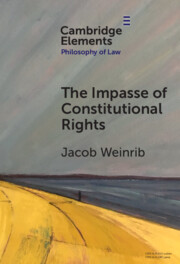Refine search
Actions for selected content:
44 results
4 - How to Tame the ‘Digital’ Shrew
- from Introduction to Part I
-
-
- Book:
- Human Rights in the Digital Domain
- Published online:
- 24 October 2025
- Print publication:
- 13 November 2025, pp 58-82
-
- Chapter
-
- You have access
- Open access
- HTML
- Export citation
Reflexive Contract Law: Party Autonomy and the Constitutional Right to a Remedy
-
- Journal:
- German Law Journal / Volume 26 / Issue 5 / June 2025
- Published online by Cambridge University Press:
- 05 November 2025, pp. 748-765
-
- Article
-
- You have access
- Open access
- HTML
- Export citation
International Law, the Courts, and the Political Branches of Singapore: Painting a Complete Picture
-
- Journal:
- Asian Journal of International Law , First View
- Published online by Cambridge University Press:
- 15 September 2025, pp. 1-24
-
- Article
-
- You have access
- Open access
- HTML
- Export citation
9 - Duty of Care
- from Part II - Merits
-
-
- Book:
- The Cambridge Handbook on Climate Litigation
- Published online:
- 03 June 2025
- Print publication:
- 31 July 2025, pp 223-249
-
- Chapter
-
- You have access
- Open access
- HTML
- Export citation
24 - Civil Disobedience
- from Part II - Modalities
-
-
- Book:
- The Cambridge Handbook of Constitutional Theory
- Published online:
- 27 March 2025
- Print publication:
- 24 April 2025, pp 397-416
-
- Chapter
- Export citation
28 - Cost–Benefit Analysis
- from Part II - Modalities
-
-
- Book:
- The Cambridge Handbook of Constitutional Theory
- Published online:
- 27 March 2025
- Print publication:
- 24 April 2025, pp 470-490
-
- Chapter
- Export citation

The Impasse of Constitutional Rights
-
- Published online:
- 04 April 2025
- Print publication:
- 06 March 2025
-
- Element
- Export citation
8 - What Is the Value of a Constitutionalized Right to Vote?
- from Part II - Constitutionalization
-
-
- Book:
- The Entrenchment of Democracy
- Published online:
- 16 December 2024
- Print publication:
- 05 December 2024, pp 155-168
-
- Chapter
-
- You have access
- Open access
- HTML
- Export citation
2 - Homelessness and the Constitution
-
- Book:
- Homelessness, Liberty and Property
- Published online:
- 14 November 2024
- Print publication:
- 21 November 2024, pp 40-61
-
- Chapter
- Export citation
6 - Constitutional Rights
- from Part II - Structural Considerations
-
- Book:
- Good Governing
- Published online:
- 23 October 2024
- Print publication:
- 17 October 2024, pp 200-236
-
- Chapter
-
- You have access
- Open access
- HTML
- Export citation
Embedding constitutional rights
-
- Journal:
- Global Constitutionalism / Volume 14 / Issue 3 / November 2025
- Published online by Cambridge University Press:
- 30 September 2024, pp. 445-467
-
- Article
-
- You have access
- Open access
- HTML
- Export citation
The constitutional codification of academic freedom over time and space
-
- Journal:
- Global Constitutionalism / Volume 14 / Issue 1 / March 2025
- Published online by Cambridge University Press:
- 25 September 2024, pp. 46-72
-
- Article
-
- You have access
- Open access
- HTML
- Export citation
Moral Pluralism and Constitutional Horizontality
-
- Journal:
- Canadian Journal of Law & Jurisprudence / Volume 37 / Issue 2 / August 2024
- Published online by Cambridge University Press:
- 09 September 2024, pp. 475-505
-
- Article
- Export citation
Chapter 13 - A Legal Perspective on Judicial Remedies to Respond to Young People’s Climate Distress
- from Part II - Multidisciplinary Perspectives on Youth Climate Distress
-
-
- Book:
- Climate Change and Youth Mental Health
- Published online:
- 06 June 2024
- Print publication:
- 13 June 2024, pp 251-268
-
- Chapter
- Export citation
3 - Speaking in a Different Voice
-
- Book:
- Reclaiming the Public
- Published online:
- 22 February 2024
- Print publication:
- 29 February 2024, pp 64-93
-
- Chapter
- Export citation
Social rights scapegoating
-
- Journal:
- Global Constitutionalism / Volume 13 / Issue 1 / March 2024
- Published online by Cambridge University Press:
- 25 August 2023, pp. 220-227
-
- Article
-
- You have access
- Open access
- HTML
- Export citation
CONSTITUTIONALISM AT COMMON LAW: THE RULE OF LAW AND JUDICIAL REVIEW
-
- Journal:
- The Cambridge Law Journal / Volume 82 / Issue 2 / July 2023
- Published online by Cambridge University Press:
- 22 May 2023, pp. 236-264
- Print publication:
- July 2023
-
- Article
-
- You have access
- Open access
- HTML
- Export citation
4 - The Right to Petition
- from Part II - Petitioners
-
- Book:
- A Nation of Petitioners
- Published online:
- 02 February 2023
- Print publication:
- 09 February 2023, pp 105-131
-
- Chapter
- Export citation
5 - Proportionality in the Case Law of the Chilean Constitutional Court
- from Part I - Proportionality and Processes of Constitutionalization
-
-
- Book:
- Proportionality and Transformation
- Published online:
- 27 October 2022
- Print publication:
- 03 November 2022, pp 110-134
-
- Chapter
- Export citation
6 - State Constitutions and the Interaction between Formal Amendment and Unwritten Commitments
-
-
- Book:
- Amending America's Unwritten Constitution
- Published online:
- 13 October 2022
- Print publication:
- 20 October 2022, pp 121-146
-
- Chapter
- Export citation
